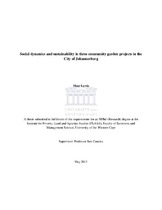Social dynamics and sustainability in three community garden projects in the City of Johannesburg
Abstract
Social dynamics and sustainability in three community garden projects in the
City of Johannesburg
M. Lewis
MPhil Master’s full thesis, the Institute for Poverty, Land and Agrarian Studies (PLAAS),
Faculty of Economic and Management Science, University of the Western Cape
This Master’s thesis explores the social dynamics of three urban and peri-urban agriculture
(UPA) community projects in the City of Johannesburg (COJ), Gauteng. It explores how these
projects originated, are organised and supported, while describing how these factors impact on
their sustainability and on the livelihoods of the people who work within them. Sayer’s (1984)
combined, extensive and intensive research design was adopted and utilised participant
observation methods, key informant interviews, literature reviews, and surveys to gather data. A
political economy framework was used to situate this data.
The thesis argues that in Johannesburg, UPA has an important role to play as a livelihood
strategy for city residents. Urban food production is typically one of many livelihood strategies
that the urban poor pursue to survive in the city. Support offered to UPA needs to consider these
dynamics and aim to provide the necessary space and assistance to facilitate such varied
livelihood activities. I argue that the current co-operative model that is being promoted for UPA
community projects is not suitable within this multiple livelihood context and that a
reconceptualization of the model should be considered that incorporates an allotment approach.
An allotment model, appropriately tailored to each individual context, could enable multiplelivelihood
strategies to flourish.
The thesis also contends that informal food networks are important food distribution mechanisms
within the South African urban context and that local food producers should be supported in their
efforts to supply to them. I argue that an allotment model would support informal food networks
which could ultimately foster various niche market sectors.
Ultimately, I argue for a better conceived support structure for UPA community projects that is
less prescriptive, more facilitative, and bases its support and development solely in participatory decision-making and community engagement. Successful and sustainable agricultural projects
in urban and peri-urban areas will be key components in ensuring food security in Africa in the
future.

